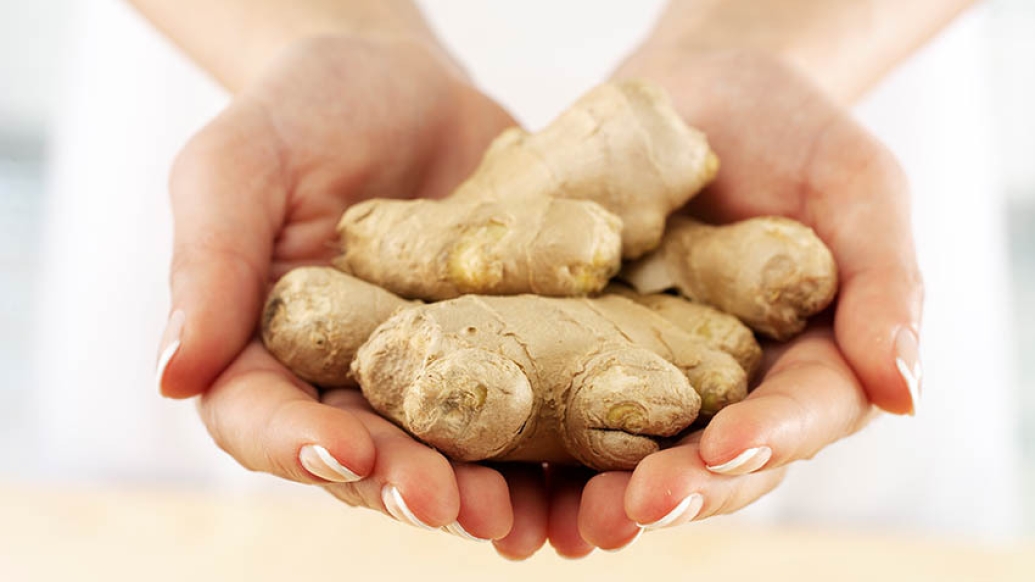The main bioactive compound of ginger root lowers autoantibody production and helps halt disease progression in mice with antiphospholipid syndrome and lupus.
9:20 AM
Author |

Naturopathic medicine, or herbal medicine, is all the rage, especially among young people. But how much of this is supported by science?
Ginger is known to have anti-inflammatory and anti-oxidative effects, making it a popular herbal supplement to treat inflammatory diseases.
And according to a Michigan Medicine led study published in JCI Insight, the main bioactive compound of ginger root, 6-gingerol, is therapeutic in countering the mechanism that fuels certain autoimmune diseases in mice. Researchers specifically looked at lupus, a disease which attacks the body's own immune system, and its often associated condition antiphospholipid syndrome, which causes blood clots, since both cause widespread inflammation and damage organs overtime.
In mice with either antiphospholipid syndrome or lupus, 6-gingerol prevented neutrophil extracellular trap release, which is triggered by the autoantibodies that these diseases produce.
"Neutrophil extracellular traps, or NETs, come from white blood cells called neutrophils," says lead author Ramadan Ali, Ph.D. "These sticky spider-web like structures are formed when autoantibodies interact with receptors on the neutrophil's surface."
According to Ali, these webs play an important role in the pathogenesis of lupus and antiphospholipid syndrome where they trigger autoantibody formation and contribute to blood vessel clotting and damage.
Like Podcasts? Add the Michigan Medicine News Break on iTunes or anywhere you listen to podcasts.
The study question was, "will the anti-inflammatory properties of ginger extend to neutrophils, and specifically, can this natural medicine stop neutrophils from making NETs that contribute to disease progression?"
"This pre-clinical study in mice offers a surprising and exciting, 'yes'," Ali says.
Ali discovered that after giving 6-gingerol, the mice had lower levels of NETs. Their tendency to make clots was also drastically reduced and 6-gingerol appeared to inhibit neutrophil enzymes called phosphodiesterases, which in turn reduced neutrophil activation.
Patients with active disease take blood thinners, but what if there was also a natural supplement that helped reduce the amount of clots they produce?Ramadan Ali, Ph.D.
But the most surprising find of all was that the mice, regardless of whether they had antiphospholipid syndrome or lupus, had reduced autoantibodies suggesting the inflammatory cycle, autoantibodies stimulating NETs which stimulate more autoantibodies, was broken.
Next steps and potential implications
"Through my years of medical training I wasn't taught much about supplements, but it's something that so many patients ask me about," says study author and rheumatologist Jason Knight, M.D. "When Ramadan brought the concept to me, I was enthusiastic to pursue it in my lab, as I knew it would matter to them. Sometimes our patients give us really good ideas!"
Although the study was done in mouse models, Ali and Knight think the preclinical data, showing that 6-gingerol has anti-neutrophil properties that may protect against autoimmune disease progression, encourages clinical trial development.
"As for basically all treatments in our field, one size does not fit all. But, I wonder if there is a subgroup of autoimmune patients with hyperactive neutrophils who might benefit from increased intake of 6-gingerol," Knight says. "It will be important to study neutrophils before and after treatment so we can determine the subgroup most likely to see benefit."
The bioactive compound can't be the primary therapy for someone with active antiphospholipid syndrome or lupus, but the team is interested to see if the natural supplement may help those at high risk for disease development.
MORE FROM THE LAB: Subscribe to our weekly newsletter
"Those that have autoantibodies, but don't have activated disease, may benefit from this treatment if 6-gingerol proves to be a protective agent in humans as it does in mice," Ali says, who's passionate about natural medicine research for rheumatic diseases.
"Patients with active disease take blood thinners, but what if there was also a natural supplement that helped reduce the amount of clots they produce? And what if we could decrease their autoantibodies?"
This research was supported by the National Institutes of Health. Other study authors include Alex A. Gandhi, MS, Lipeng Dai, Ph.D., Julia K. Weiner, Shanea K. Estes, M.L.I, Srilakshmi Yalavarthi, MS, Kelsey Gockman and Duxin Sun, Ph.D.
Paper Cited: "Anti-neutrophil properties of natural gingerols in models of lupus," JCI Insight. DOI: 10.1172/jci.insight.138385

Explore a variety of health care news & stories by visiting the Health Lab home page for more articles.

Department of Communication at Michigan Medicine
Want top health & research news weekly? Sign up for Health Lab’s newsletters today!





